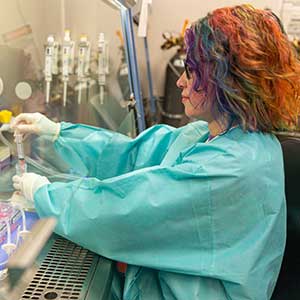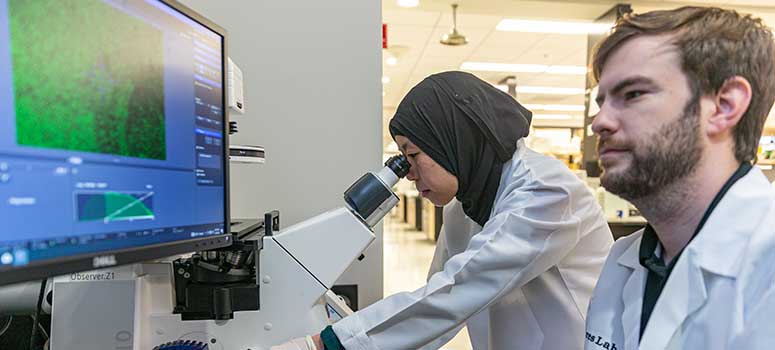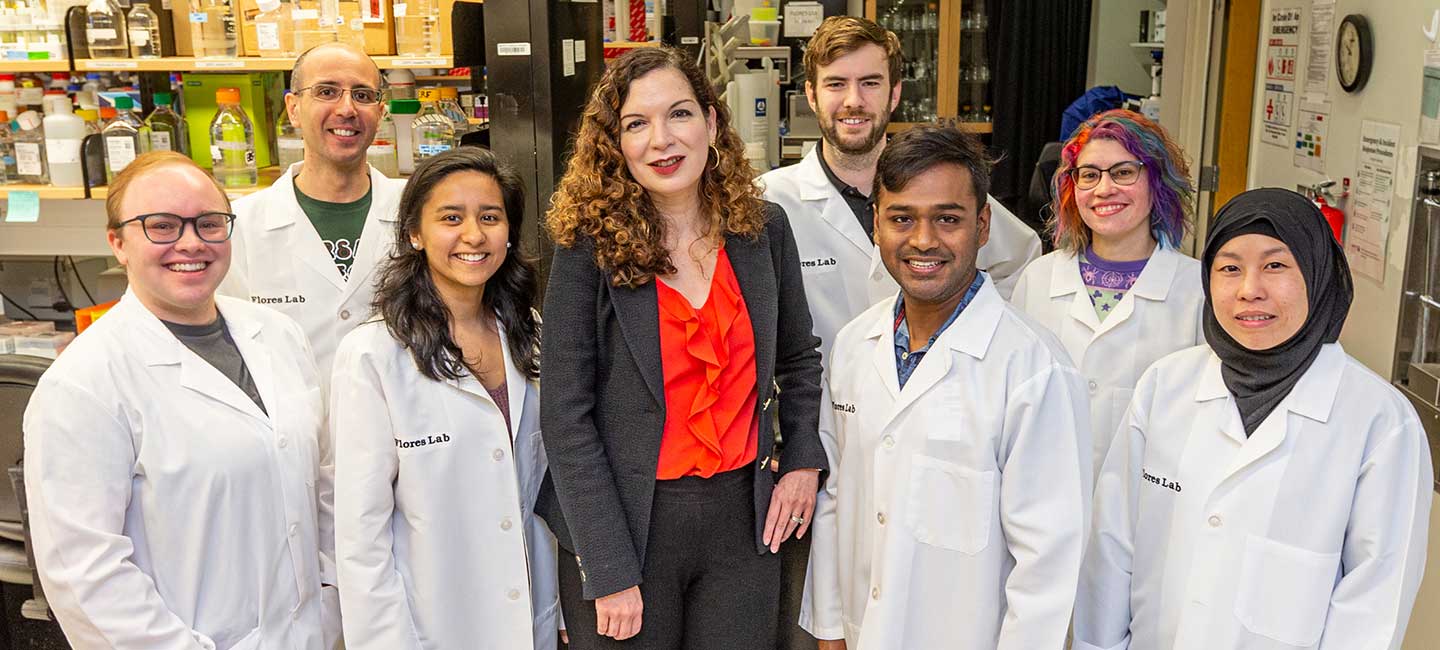Miles for Moffitt Keeps Researchers on Pace to Find New Cancer Treatments
Dr. Elsa R. Flores is rounding up the Research Rangers, a team of Moffitt Cancer Center basic scientists that participates every year in Miles for Moffitt, presented by AutoNation. This year, the team will once again hit the ground running (or walking) to raise money for lifesaving cancer research, a mission they work toward every day. But for Flores, associate center director of Basic Science, this isn’t the only team of expert researchers that Miles for Moffitt has mobilized.
In 2018, Flores was awarded a $200,000 grant from Miles for Moffitt to bring together a team to study how lung tumors metabolize nutrients. The goal was to identify these metabolic pathways and therapeutically target the tumors.
“Common chemotherapy hits all proliferating cells, not just the cancer cells. These dividing cells are present in the intestines and hair follicles. That’s why people lose their hair and have a lot of digestive issues. Chemotherapy is very nonspecific,” Flores explained. “The goal is trying to find therapies that target specific pathways rather than killing every cell, including healthy tissues.”
Getting the Projects Off the Ground
Lung cancer is the leading cause of cancer deaths worldwide. The metabolic research is promising, but it could take years to complete. The Miles for Moffitt grant provided the seeds to get started.
The initial funding allowed Flores to bring together a team of top scientists and clinicians who shared an interest in tumor metabolism, immunotherapy and groundbreaking treatments that could be gentler for patients with lung cancer. The team, known as the Lung Cancer Metabolism Working Group, is focused on four overarching projects:
- Flores is studying the tumor suppressor gene p53, which is commonly mutated in lung, breast and skin cancers. Her research is focused on understanding that pathway and finding new therapeutics that rewire the metabolism of lung cancer cells.
- Gina DeNicola, interim chair of the Department of Metabolism and Physiology and leader of the Metabolism Program, is studying the Nrf2 gene, which is also commonly mutated in lung cancer and is known to be involved in metabolism.
- John Cleveland, chief scientific officer and center director, and Eric Haura, associate center director for Clinical Science and director of the Lung Cancer Center of Excellence, are studying the myc gene and working to understand the commonalities between the two major types of lung cancer ― non-small cell lung cancer and small cell lung cancer ― to find common therapies.
- Paulo Rodriguez, chair of the Department of Immunology and co-leader of the Immuno-Oncology Program, is focused on boosting the immune system and profiling the metabolism of immune cells, looking for metabolic treatments that could improve immunity and treat cancer.
The Miles for Moffitt grant in 2018 enabled the team to begin setting up the infrastructure needed for their research, including developing preclinical models to study tumors, training a machine learning tool to grade the aggressiveness of tumors, and building a lung cancer data repository for quick analysis. In addition, the grant provided funding to hire a program manager to facilitate collaboration among the scientists.

Suehelay Acevedo Acevedo, a post-doc fellow in Dr. Flores' lab, works on a culture of an ex vivo cancer model.
As the foundations for the research were laid, Flores and the team had their sights set on securing long-term funding through a high-profile National Cancer Institute grant known as a Program Project Grant (P01). A P01 grant brings multiple investigators together to study projects that share a common theme or focus. In the spring of 2018, the team travelled to the National Cancer Institute (NCI) in Washington, D.C., to pitch their research to program officers and get guidance on submitting for the P01 grant.
“The P01 application process is complex with multiple components and projects packaged in one application,” the NCI notes on its website. When the scientists submitted their initial application, they received positive feedback but were told that additional research needed to be done.
“You’re doing all this work before you can get the P01 funding,” Flores explained. “So the Miles for Moffitt funding was instrumental in each project getting off the ground.”
In 2019 and again in 2020, the team received two additional grants from Miles for Moffitt to keep their work going as they prepared to resubmit for the P01 funding. The Miles for Moffitt grants gave the researchers the funds they needed to accelerate the data required for the resubmission. The grants also funded additional infrastructure needs that the P01 would not cover.
Perhaps most importantly, the funding kept the research projects moving forward when COVID threatened to bring everything to a standstill in 2020.

“We were working in shifts. We knew we needed to get data out,” Flores remembered. “So having that funding helped keep the team together and working on the project.”
In 2021, the team resubmitted their application to the NCI. They soon received good news: The NCI awarded the group a five-year $10.2 million P01 grant.
The federal funding now supports the research as the team works together to unveil common metabolic mechanisms regulated by common genetic drivers. The team hopes to use that information to identify existing drugs that could be repurposed to treat cancer or find new targets for developing drugs.
The working group meets regularly to discuss what they are learning and to share ideas. They also convene an external advisory board of lung cancer and metabolism experts from across the country to get their advice on the best experimental avenues to follow.
“Working together really helps accelerate discovery that you wouldn’t have been able to do on your own,” said Flores, who is the principal investigator for the P01.
More Projects in the Works
In the meantime, the Miles for Moffitt grants that initially brought the team together have led to other collaborations that show promise for new treatments.
“Miles for Moffitt helps spark new projects. The three Miles for Moffitt grants helped these projects get off the ground enough to secure much more funding,” Flores said. “And we have a lot of new projects that have come out of this.”
As Flores prepares to lead the Research Rangers at this year’s Miles for Moffitt, she knows firsthand how much the funds raised will impact cancer research. Since the event started in 2006, participants have raised over $11 million, helping Moffitt researchers pilot new discoveries to create groundbreaking and advanced treatments that improve the lives of cancer patients.
To be a part of the Moffitt mission, join Flores in downtown Tampa on Nov. 18 for the 2023 Miles for Moffitt. For more information or to register, visit MilesforMoffitt.com.

Postdoc fellows Ashley Lui and John Lockhart are part of the team investigating new pathways to target lung tumors.



